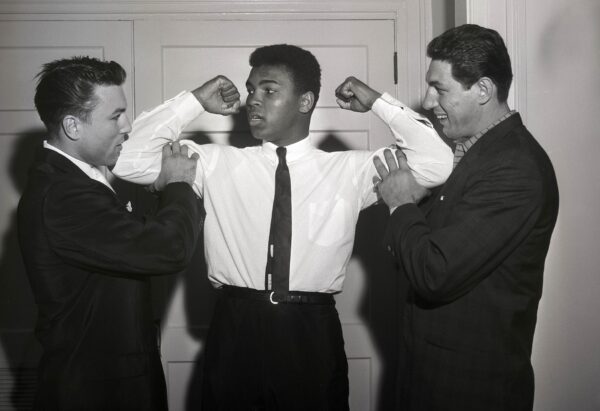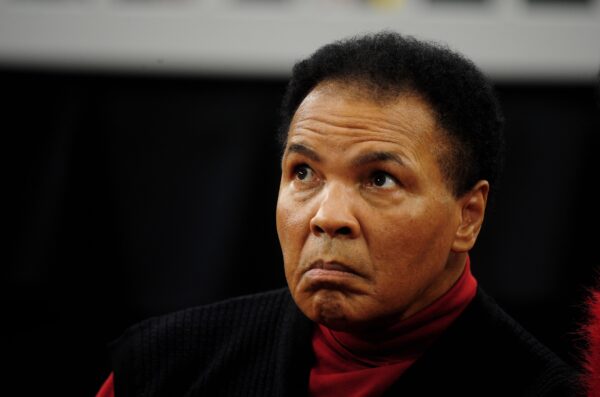Muhammad Ali, born Cassius Marcellus Clay Jr. on January 17, 1942, in Louisville, Kentucky, is an iconic figure in boxing and a symbol of social change. His journey began at age 12 under the mentorship of Louisville policeman Joe Martin. After winning a gold medal at the 1960 Olympic Games, he turned professional, supported by the Louisville Sponsoring Group. Known for his charm and poetry, Ali quickly became a cultural phenomenon.

Sep 24, 1963; Louisville, KY, USA: FILE PHOTO; Cassius Clay a/k/a Muhammad Ali (center) poses with boxers Mike DeJohn (right) and George Chuvalo (right) at the Sheraton Hotel in Louisville. Mandatory Credit: Charley Pence/The Courier-Journal-USA TODAY Sports
His rise to fame was marked by a stunning upset over Sonny Liston in 1964, after which he joined the Nation of Islam and changed his name to Muhammad Ali. Ali’s dominance in the ring was unparalleled, marked by victories over notable opponents like Floyd Patterson, George Chuvalo, and Ernie Terrell. His refusal to be drafted into the U.S. Army during the Vietnam War, citing religious beliefs, led to a controversial legal battle, resulting in his title being stripped and a ban from boxing.
Ali made a triumphant return to the ring in 1970, showcasing his undiminished skills against Jerry Quarry and Oscar Bonavena. Despite losing to Joe Frazier in 1971, Ali’s relentless spirit led him to win 10 consecutive fights. His rematch with Frazier and the legendary “Rumble in the Jungle” against George Foreman in 1974, where he regained the heavyweight title using his famous “rope-a-dope” strategy, solidified his status as a boxing legend.

Apr 19, 1961; Louisville, KY; USA: FILE PHOTO; State boxing commissioner Bob Evans and boxer LaMar Clark look on as Cassius Clay aka Muhammad Ali weighs in before their fight at Freedom Hall. Ali defeated Clark in the 2nd round by KO. Mandatory Credit: Charles Fentress/The Courier-Journal-USA TODAY Sports
The latter part of Ali’s career saw battles with Frazier in the “Thrilla in Manila” and losses to Leon Spinks and Trevor Berbick. Retiring in 1981, Ali’s legacy as one of the greatest fighters in history was cemented, with a record of 56 wins and 5 losses.
Ali’s later years were marked by a struggle with Parkinson syndrome, likely due to boxing injuries. His religious views evolved towards a more inclusive understanding of Islam, distancing himself from the separatist teachings of the Nation of Islam. He married his fourth wife, Lonnie, in 1986, and his daughter Laila Ali followed in his footsteps as a professional boxer.

Dec. 20, 2008; Glendale, AZ, USA; Former boxer Muhammad Ali in attendance of the Minnesota Golden Gophers against the Louisville Cardinals game at the Stadium Shootout at University of Phoenix Stadium. Mandatory Credit: Mark J. Rebilas-USA TODAY Sports
Ali’s life and legacy were celebrated in films, documentaries, and his lighting of the Olympic flame in 1996, demonstrating his enduring status as a beloved global figure. He was inducted into the International Boxing Hall of Fame and received the Presidential Medal of Freedom in recognition of his contributions both in and out of the ring????????????.
